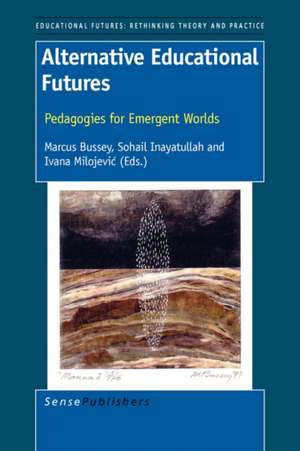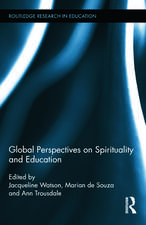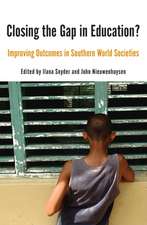Alternative Educational Futures: Pedagogies for Emergent Worlds: Educational Futures, cartea 21
Marcus Bussey, Sohail Inayatullah, Ivana Milojevićen Limba Engleză Paperback – 31 dec 2007
Din seria Educational Futures
-
 Preț: 411.87 lei
Preț: 411.87 lei -
 Preț: 383.59 lei
Preț: 383.59 lei -
 Preț: 398.22 lei
Preț: 398.22 lei -
 Preț: 332.44 lei
Preț: 332.44 lei -
 Preț: 417.15 lei
Preț: 417.15 lei -
 Preț: 402.76 lei
Preț: 402.76 lei -
 Preț: 410.06 lei
Preț: 410.06 lei -
 Preț: 402.55 lei
Preț: 402.55 lei -
 Preț: 394.12 lei
Preț: 394.12 lei -
 Preț: 424.34 lei
Preț: 424.34 lei -
 Preț: 396.75 lei
Preț: 396.75 lei -
 Preț: 412.41 lei
Preț: 412.41 lei -
 Preț: 392.15 lei
Preț: 392.15 lei -
 Preț: 381.00 lei
Preț: 381.00 lei -
 Preț: 401.80 lei
Preț: 401.80 lei -
 Preț: 397.53 lei
Preț: 397.53 lei -
 Preț: 389.75 lei
Preț: 389.75 lei -
 Preț: 384.73 lei
Preț: 384.73 lei -
 Preț: 395.91 lei
Preț: 395.91 lei -
 Preț: 419.31 lei
Preț: 419.31 lei -
 Preț: 388.53 lei
Preț: 388.53 lei -
 Preț: 394.46 lei
Preț: 394.46 lei -
 Preț: 384.94 lei
Preț: 384.94 lei -
 Preț: 478.71 lei
Preț: 478.71 lei -
 Preț: 412.69 lei
Preț: 412.69 lei -
 Preț: 432.39 lei
Preț: 432.39 lei -
 Preț: 394.12 lei
Preț: 394.12 lei -
 Preț: 402.73 lei
Preț: 402.73 lei -
 Preț: 397.48 lei
Preț: 397.48 lei -
 Preț: 385.17 lei
Preț: 385.17 lei - 19%
 Preț: 562.52 lei
Preț: 562.52 lei - 19%
 Preț: 598.69 lei
Preț: 598.69 lei -
 Preț: 406.94 lei
Preț: 406.94 lei - 19%
 Preț: 594.66 lei
Preț: 594.66 lei -
 Preț: 384.73 lei
Preț: 384.73 lei -
 Preț: 407.84 lei
Preț: 407.84 lei -
 Preț: 385.81 lei
Preț: 385.81 lei -
 Preț: 407.84 lei
Preț: 407.84 lei -
 Preț: 398.45 lei
Preț: 398.45 lei
Preț: 404.55 lei
Nou
Puncte Express: 607
Preț estimativ în valută:
77.44€ • 84.14$ • 65.09£
77.44€ • 84.14$ • 65.09£
Carte tipărită la comandă
Livrare economică 17-23 aprilie
Preluare comenzi: 021 569.72.76
Specificații
ISBN-13: 9789087905118
ISBN-10: 9087905114
Pagini: 324
Dimensiuni: 155 x 235 x 17 mm
Greutate: 0.45 kg
Editura: Brill
Colecția Brill
Seria Educational Futures
ISBN-10: 9087905114
Pagini: 324
Dimensiuni: 155 x 235 x 17 mm
Greutate: 0.45 kg
Editura: Brill
Colecția Brill
Seria Educational Futures
Recenzii
“We desperately need the dynamic revolution in education that this book offers us, reflecting the new ways of thinking and being on this planet that will permit us to live in peace as a global family even through massive climate changes. Read it and put these ideas into practice as quickly as possible in any ways you can!” —Elisabet Sahtouris, Evolutionary biologist and futurist, author of EarthDance: Living Systems in Evolution
“Fasten your seatbelts before you enter this collection of provocative, sometimes brilliant, essays, because it will take you at warp speed on a journey to many places you have not conceived of before, places where your past understandings and current beliefs may be shaken up. Basing their work on theory, imaginative thinking, empirical social research, or case studies, the authors map, create, explore, and evaluate alternative futures for education, from grade schools to universities and beyond. Every educator-indeed every citizen-ought to read this book as an inspiration and guide to making teaching and learning more effective, appropriate, equitable, and flexible in a rapidly changing world.” —Wendell Bell, Yale University, Author of Foundations of Futures Studies Volumes 1 & 2
“Alternative Educational Futures challenges mechanistic models of curriculum and pedagogy predicated on linear thinking, control and predictability. Both individually and collectively, the editors and contributing authors generate multifaceted understandings of futures in and for education that are open, recursive, organic and emergent. This is a text that performs what it represents by questioning its assumptions, permitting contradictions, tolerating ambiguities, and resisting the pernicious and pervasive politics of complexity reduction in education and society. These adventures in thinking should be an invaluable resource - and source of inspiration - for all who care about the quality of education for immanent yet unpredictable futures.” —Noel Gough, Professor of Outdoor and Environmental Education, Director, Centre for Excellence in Outdoor and Environmental Education, President, Australian Association for Research in Education Editor: Transnational Curriculum Inquiry
“This book is of particular interest to all educators and educational managers. It is not shy in addressing current challenges and limitations of educational systems and institutions. It awakens or re-connects the reader with their values and aspirations for educational outcomes and alerts them to their social responsibilities. It addresses, in a world of rapid change, education about, of and for the future and inspires readers to choose their future rather than perpetuating their past.” —Pam Dyer, Dean, Faculty of Arts and Social Science, University of the Sunshine Coast
“Fasten your seatbelts before you enter this collection of provocative, sometimes brilliant, essays, because it will take you at warp speed on a journey to many places you have not conceived of before, places where your past understandings and current beliefs may be shaken up. Basing their work on theory, imaginative thinking, empirical social research, or case studies, the authors map, create, explore, and evaluate alternative futures for education, from grade schools to universities and beyond. Every educator-indeed every citizen-ought to read this book as an inspiration and guide to making teaching and learning more effective, appropriate, equitable, and flexible in a rapidly changing world.” —Wendell Bell, Yale University, Author of Foundations of Futures Studies Volumes 1 & 2
“Alternative Educational Futures challenges mechanistic models of curriculum and pedagogy predicated on linear thinking, control and predictability. Both individually and collectively, the editors and contributing authors generate multifaceted understandings of futures in and for education that are open, recursive, organic and emergent. This is a text that performs what it represents by questioning its assumptions, permitting contradictions, tolerating ambiguities, and resisting the pernicious and pervasive politics of complexity reduction in education and society. These adventures in thinking should be an invaluable resource - and source of inspiration - for all who care about the quality of education for immanent yet unpredictable futures.” —Noel Gough, Professor of Outdoor and Environmental Education, Director, Centre for Excellence in Outdoor and Environmental Education, President, Australian Association for Research in Education Editor: Transnational Curriculum Inquiry
“This book is of particular interest to all educators and educational managers. It is not shy in addressing current challenges and limitations of educational systems and institutions. It awakens or re-connects the reader with their values and aspirations for educational outcomes and alerts them to their social responsibilities. It addresses, in a world of rapid change, education about, of and for the future and inspires readers to choose their future rather than perpetuating their past.” —Pam Dyer, Dean, Faculty of Arts and Social Science, University of the Sunshine Coast











